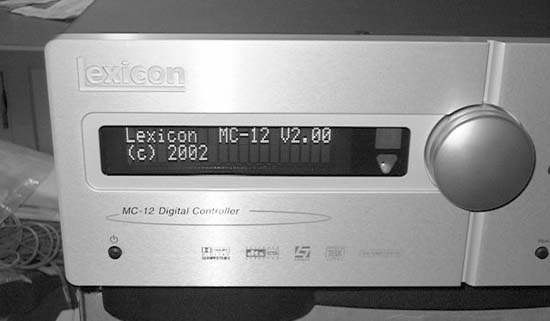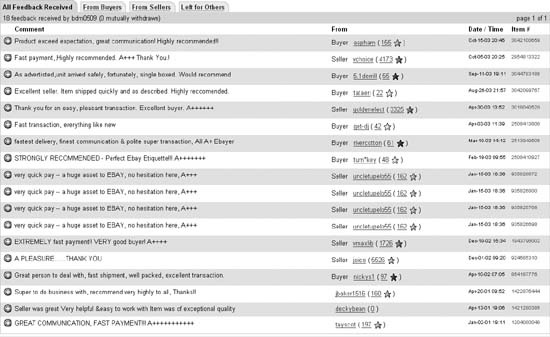Although ebay.com isn't the best place to buy all your gear, it's a great source for certain types of gear, often at lower-than-normal prices.
No book on buying anything would be complete without mentioning eBay. One of the largest and most diverse marketplaces around (online or otherwise), eBay is a good source of a lot of electronics, including home theater components. You'll often find slightly used or B-stock gear at killer prices that aren't available anywhere else. With all that said, you'll need to be just as careful with eBay (if not more so) as you are when shopping at a chain [Hack #3] .
One of the keys to using eBay to your advantage is determining what you can and can't buy online. More accurately, this could be phrased as figuring out what you should and shouldn't buy online.
The basic rule of thumb is that if an item is essentially a stock item, it's fair game for buying online. Stock items are anything that is manufactured and is generally the same across the board. For example, receivers are a stock item; as long as you have the same manufacturer and model, they're going to sound more or less the same, unit after unit, as long as they're in good condition. The same goes for DVD players, VCRs, CD players, and most other audio/video components.
Where you get into trouble is with items that, even when manufactured, don't always come out exactly the same. Speakers fall into this category. I've listened to two "identical" speakers that don't sound at all alike. You also need to be very cautious about items that have great potential for damage in transit. Although you can pack a DVD player in a ton of foam, it's very hard to ship speakers, as well as larger items such as TVs, without causing some shakeup. At a minimum, you're probably going to have to calibrate [Hack #61] these devices (which might mean paying a professional, if things are really out of whack). This also is true, although somewhat less so, with receivers and preamplifiers. These can be shipped safely, but be prepared to spend a lot of time explaining what you want to the seller, and ensuring that they follow through.
In general, stick to your more basic components, such as DVD players, CD players, and other video units, and you'll have far fewer problems.
One of the greatest boons of eBay, and yet one of its potential downfalls, is the ability for literally anyone to sign on, in complete anonymity. Like any good thing, it hasn't taken long for people who are out to make a fast buck to figure out ways to exploit the system. As a result, you'll have to be careful to avoid getting ripped off; home theater, along with musical instruments, is a primary target for these scam artists. You can do several things to minimize your risk if you do shop online, though.
A great way to separate scammers from real sellers is through pictures of the item for sale. Often, these are part of the listing, and you can form an initial impression. One giveaway of a potential scam is to see a picture pulled off of a product web site. For example, Figure 1-5 shows a Lexicon MC-12 from the Lexicon web site (http://www.lexicon.com). It's as stock as it gets, and no more represents a real unit than a hand drawing.
Figure 1-6, on the other hand, shows a picture that obviously was taken in someone's home.
If you don't see any realistic pictures, email the seller and ask about it; a real seller won't be offended in the least. If you're still concerned, ask for additional pictures of the equipment in an unusual (and therefore inaccessible from a vendor web site) position; pictures of the top, bottom, or sides of the unit are always great. Again, a legitimate seller won't be upset in the least by this.
The same principles apply for "new, in the box" auctions, which sometimes show up. Although the seller might not want to take the unit out of the box, you can ask for different shots of the box, such as close-ups. In one auction, I even asked the seller to make a small mark on the box and photograph it; I had no doubts about the seller once he did what I requested. Remember, nothing says a buyer has to accept things just the way they are; only a fool buys from an anonymous, seemingly illegitimate seller.
This should be obvious, but you need to take a close look at feedback on eBay; it's there for a reason. Buying a high-end piece of equipment from someone who's sold only two items before is a risky venture, at best. Also be on the alert for users who have changed their username or are brand-new (signified by the eBay sunglasses), as there's another potential for problems.
In addition to looking at the number of transactions, always click through to the actual feedback itself. Reading through these comments often alerts you to how the seller handles payment, how quickly he ships, and how easy he is to work with. Of equal importance is to check out how many times the seller has actually sold before. Figure 1-7 shows my profile, where you see a good mix of buying and selling. It's also OK if someone sells all the time, but don't buy high-end gear from someone who's never sold before!
A great way to feel out a seller is to simply email himâ repeatedly. Email certainly isn't as personal as a phone call or a face-to-face meeting, but you often can get a feel for someone through a few emails. Ask about the equipment, and make sure you get detailed responses. If you've exhausted your equipment questions, ask about the shipping policies; and then ask if he's sold similar items before; then ask about his payment policies. Often, you don't need to pay attention to the specifics of his replies as much as to the tone and feel. Are you dealing with an open person who seems to care about the transaction? Or is the seller testy, impatient, and prone to be slow and unresponsive? The latter could indicate that you're not going to have a pleasant experience.
If you're buying a high-dollar item, it's perfectly reasonable to ask for a brief phone discussion. Any seller not willing to spend 10 minutes on the phone for the sake of selling a multithousand-dollar item isn't worth your time.
Get Home Theater Hacks now with the O’Reilly learning platform.
O’Reilly members experience books, live events, courses curated by job role, and more from O’Reilly and nearly 200 top publishers.




